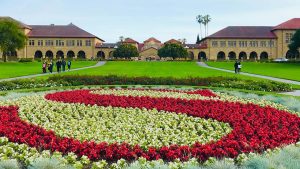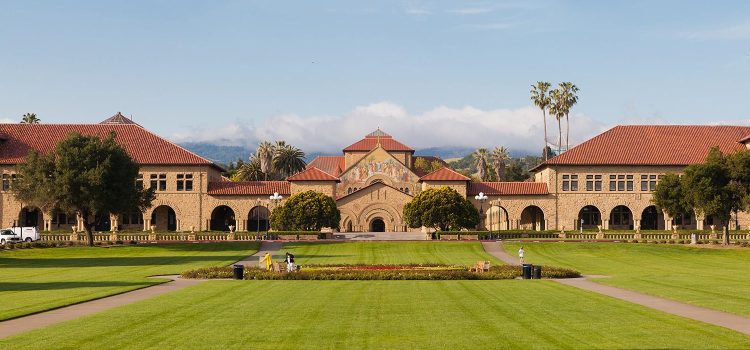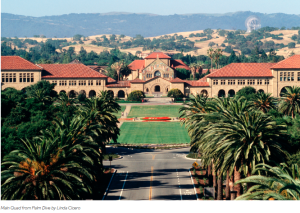
Introduction
Nestled in the picturesque landscapes of Stanford, California, amid the rolling hills and verdant expanses of the San Francisco Peninsula, Stanford University stands as an architectural and intellectual marvel. Established in 1885, this prestigious institution, with its iconic sandstone buildings and sprawling campus, embodies the vision of its founders, Leland and Jane Stanford, who sought to create a beacon of learning and innovation. Envisioned as a memorial to their son and dedicated to advancing knowledge, Stanford University has flourished into a global hub of academic excellence, pushing the frontiers of education, research, and societal impact. Its legacy spans generations, drawing scholars, visionaries, and changemakers from around the world to partake in an intellectual journey that marries tradition with cutting-edge exploration, fostering an environment where creativity, collaboration, and boundless curiosity thrive. The university’s commitment to shaping future leaders, catalyzing groundbreaking discoveries, and addressing the most pressing global challenges underscores its unwavering dedication to not just educating minds, but shaping a better world for generations to come.

History and Founding Principles
Stanford University’s history is deeply rooted in its founding principles of merging academic rigor with practical application. Leland and Jane Stanford envisioned a university that would contribute to society through education and research. The tragic loss of their son prompted the establishment of the university, emphasizing the commitment to fostering innovation and creating opportunities for future generations. The Stanford campus spans over 8,180 acres of beautifully landscaped grounds, blending Spanish-style architecture with modern facilities. The university boasts state-of-the-art research facilities, libraries housing extensive collections, world-class laboratories, and technological resources that empower students and faculty in their pursuit of knowledge and innovation.
Academic Programs
Stanford University offers a wide array of academic programs across seven schools, including Humanities and Sciences, Engineering, Medicine, Law, Business, Earth, Energy & Environmental Sciences, and Education. Each school is renowned for its specialized curriculum, faculty expertise, and interdisciplinary approach, fostering a holistic learning environment. The university is also known for its commitment to innovation in education, offering unique interdisciplinary programs and encouraging students to explore diverse fields of study through cross-disciplinary collaboration. Stanford University prides itself on its distinguished faculty, comprising Nobel laureates, MacArthur Fellows, Pulitzer Prize winners, and leading experts in their respective fields. These scholars and researchers play a pivotal role in shaping global discourse, pioneering breakthroughs, and mentoring the next generation of leaders.

Research and Innovation
The university’s commitment to groundbreaking research is evident through its numerous research centers and institutes focusing on diverse fields such as artificial intelligence, biotechnology, clean energy, and more. Stanford’s collaborative approach encourages interdisciplinary research, leading to transformative discoveries with real-world applications. Stanford’s proximity to Silicon Valley has fostered an unparalleled culture of innovation and entrepreneurship. The university has been instrumental in nurturing startups, fostering a spirit of creativity and risk-taking among students and alumni, leading to the creation of numerous successful companies that have redefined industries. Stanford University is home to a vibrant and diverse student community representing various cultures, backgrounds, and perspectives. The university provides a plethora of extracurricular activities, clubs, and organizations that cater to diverse interests, promoting inclusivity and personal growth beyond academics. The campus offers a dynamic living-learning environment, with residential programs, cultural events, and opportunities for community engagement, creating a close-knit and supportive community for students. Beyond academic achievements, Stanford University has made significant contributions to society. Its graduates have excelled in various fields, becoming leaders, policymakers, innovators, and influencers worldwide. The university’s commitment to social responsibility is evident through initiatives addressing global challenges such as healthcare disparities, environmental sustainability, and social justice.

Table Detail
| Facets of Stanford University | Details |
|---|---|
| Location | Stanford, California, USA |
| Founding Year | 1885 |
| Founders | Leland Stanford and Jane Stanford |
| Motto | “Die Luft der Freiheit weht” (The wind of freedom blows) |
| Schools | |
| – Humanities and Sciences | Offers a wide range of liberal arts programs |
| – Engineering | Renowned for its innovation and technological advancements |
| – Medicine | Pioneering research in healthcare and medical sciences |
| – Business | Stanford Graduate School of Business (GSB) is highly ranked globally |
| – Law | Stanford Law School is prestigious and innovative |
| – Education | Focuses on education theory, policy, and practice |
| – Earth Sciences | Emphasis on environmental studies and geosciences |
| Academic Offerings | Undergraduate and graduate programs across diverse disciplines |
| Faculty | Nobel laureates, Pulitzer Prize winners, MacArthur Fellows |
| Research Focus | Interdisciplinary research centers in AI, biosciences, renewable energy, etc. |
| Innovation Initiatives | |
| – d.school (Hasso Plattner Institute of Design) | Promotes design thinking and creativity |
| – Stanford Research Park | Nurtures startups and technology companies |
| – Stanford Technology Ventures Program (STVP) | Fosters entrepreneurship among students and alumni |
| Campus Facilities | State-of-the-art libraries, research centers, athletic facilities |
| Campus Life | Vibrant community with diverse clubs, organizations, and cultural groups |
| Sustainability Efforts | Initiatives for reducing environmental impact and promoting eco-stewardship |
| Global Engagement | Collaborations addressing global challenges in healthcare, climate change, etc. |
| Public Service Initiatives | Haas Center for Public Service promotes community-based projects and volunteerism |
| Motto | “Die Luft der Freiheit weht” (The wind of freedom blows) |
| Conclusion | Stanford University stands as a beacon of academic excellence, innovation, and global impact, fostering a community dedicated to knowledge, progress, and societal betterment. |











